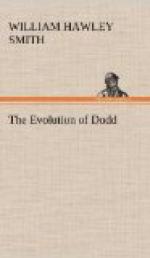Is it, or is it not, better so?
Amos Waughops (pronounced Wops, but spelled W-a-u-g-h-o-p-s, such is the tyranny laid upon us by those who invented the spelling of proper names, and who have upon their invention the never-expiring patent of custom), had charge of the school that fall. He had been hired for six months, beginning the last week in August. School was begun thus early for the sake of getting an extra week of vacation during the Indian summer days of November, when the school would close for a while to give the boys and girls a chance to “help through corn-shucking,” and still get in days enough in the school year to be sure to draw school money.
Amos had but one reason for being a school teacher, and that was, he was a cripple. Like the uncouth Richard, he had been sent into the world but half made up, and a club foot, of immense proportions, rendered locomotion so great a task that he was compelled, per force, to choose some occupation by which he could earn a living without the use of his legs.
He had been endowed by nature with what is commonly known as “a good flow of language.” He learned to talk when very young and his tongue once started, its periods of rest had been few. From a youth he was noted for his ability to “argy.” He was the hero of the rural debating society and would argue any side of any question with any man on a moment’s notice. If the question happened to be one of which he had never heard and concerning which he knew nothing, such a condition did not embarrass him in the least; he would begin to talk and talk fluently by the hour, if need be, till his opponent would succumb through sheer exhaustion.
He had been to school but little, and had not profited much by what instruction he had received while there. It was an idea early adopted by him that a “self-made man” was the highest type of the race, and to him a self-made man was one who worked like the original Creator—made everything out of nothing and called it all very good.
So it was that, being ignorant, despising both books and teachers, and yet being able to talk glibly, he came to the conclusion that words were wisdom, and a rattling tongue identical with a well-stored mind—a not uncommon error in the genus under the glass just now.
I am sure I shall be pardoned, too, if I still further probe in this direction, and unfold a little more the nature of the circumstances that had to do with the evolution of “Dodd” while he went to school to Amos Waughops, in “deestrick four.” As the plot unfolds, and it shall appear what kind of a pupil-carpenter Amos really was, you may wonder how it happened that such a blunderer ever got into that workshop, the school room, and had a chance to try his tools on “Dodd.” Wait a minute, and verily you shall find out about this.




